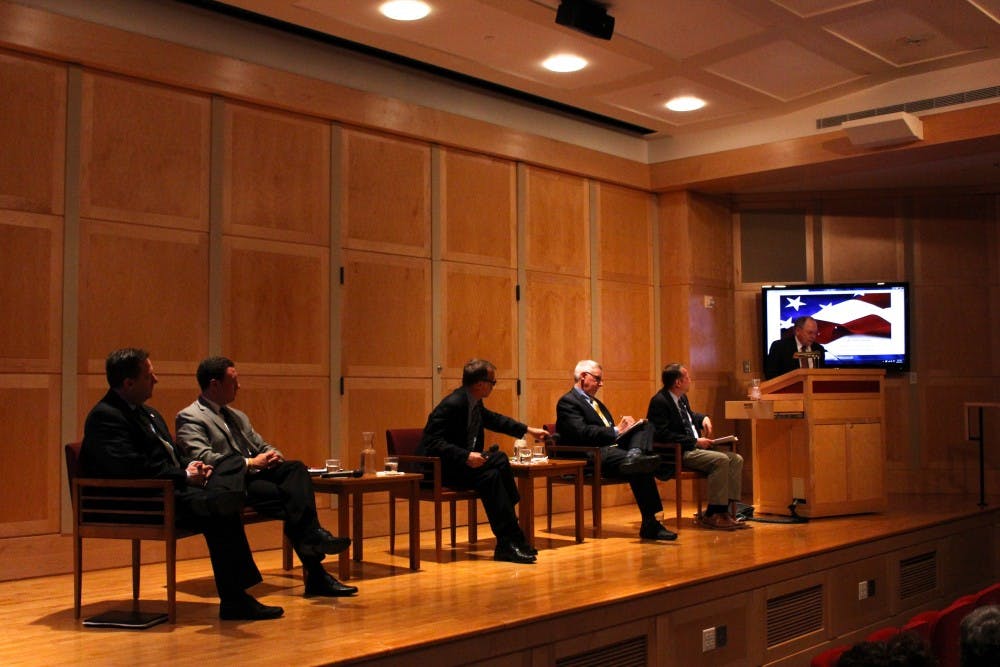Panelists discuss pros and cons of Michigan road tax initiative

The Central Michigan University College of Humanities & Social & Behavioral Sciences held a Griffin Policy Forum to discuss the benefits and drawbacks of the May 5th ballot proposal on April 20 in the Park Library Auditorium.
The spring Griffin Policy Forum weighted the advantages and potential consequences of Proposal 15-1 Monday. While some argued that the proposal called for the state to raise too much revenue, others argued that the proposal did have merit.
The proposal, which will be on the ballot May 5, will increase Michigan's sales tax to seven cents per dollar, which would tie the state with California for the highest sales tax.
Michigan's sales tax has not been altered since 1982.
The panel was comprised of legislative assistant John Lamacchia, retired Chairman and CEO of Ross Medical Education Center Paul Mitchell, Central Michigan University economics faculty Jason Taylor, Director of State Affairs for the Michigan Municipal League Chris Hackbarth and Managing Editor and State Capitol Bureau Chief of Michigan Public Radio Rick Pluta, who moderated the debate.
Mitchell, a member of the private sector, said the proposal raised by the bill would generate $1.2 billion for road repair. Approximately $700 million in "ransom" as one that would only generate $1.2 billion to roads, and hold approximately $700 million "ransom" for other state initiatives. While the roads do need to be improved, he said, the proposal should only call for the $1.2 billion necessary to cover the costs of improving transportation.
"We should not have to pay a $700 million ransom just to get our roads fixed," he said.
Mitchell also noted that the additional costs were added Dec. 18 and 19.
"This is a roads bill that suddenly became a Chrismas tree on the 18th and 19th to gather votes to get this passed May 5th," he said.
Lamacchia argued that while there were last-minute provisions, it was a necessary "compromise."
"It's a fair statement that if this were easy, it would have been done already," Pluta said.
Community members and students participated in the forum, including Mount Pleasant resident Nicholas Madaj, 31, who inquired about the Headlee Amendment, a tax-limitation amendment, bringing to light the fact that Michigan is $4 billion below its tax limit.
"The Michigan constitution can be straightforward and it can be complex, and determines the size of state government," Madaj said. "We've had this limit since 1978 and that seems to be ignored not by policy makers, but it's important to keep it in mind."
Bad Axe senior Tom Steinbis said he appreciated this opportunity to learn more about the proposal, but believed that student interest needs to be higher.
"There weren't a lot of students here tonight," Steinbis said. "It was educational, but there needs to be more of the seats filled."
Faculty and administration staff, including Dean of The College of Humanities and Social and Behavioral Sciences Pam Gates, also received an education on the bill.
The panel was described as "lively" by Gates.
"I'm going to go home and do more homework," Gates said. "I think that these are excellent opportunities to get people engaged and most of us come away wanting more information."
"It's a fair statement that if this were easy, it would have been done already," Pluta said.
This forum was dedicated to the late Robert Griffin, 91, who died last week. Griffin was a CMU alumnus who made contributions throughout his life to his alma mater.
Gates asked that any donations be made to the Griffin Endowed Chair in American Government, who performs political science research. Gary Randall is the 5th an current chair.
Lamacchia substituted for Senator Wayne Schmidt Monday, who took leave to spend time with the Griffin family.
This event was sponsored by the College of Humanities and Social and Behavioral Sciences.



